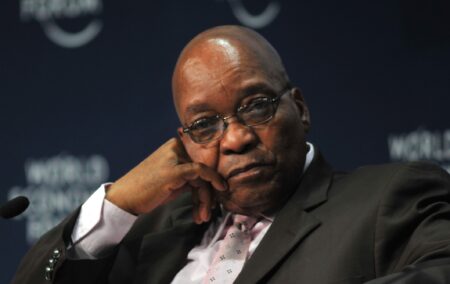Neither former President Jacob Zuma’s ‘departure for foreign shores, nor friends in the ANC-appointed executive, ought to be able to keep (him) from the order that he go back to prison’, says the Institute of Race Relations (IRR).
‘The lesson to South Africans, particularly the most powerful, must be that no one is above the law. Time spent behind bars by the former President, a charismatic man of senior age with many sympathisers, manifests that lesson in concrete and steel,’ the Institute says in a statement.
The IRR notes that while here have been ‘widespread calls for former President Jacob Zuma to go to jail, but at least two considerable obstacles could prevent that’.
‘First, Zuma is abroad, reportedly receiving medical treatment. This raises the question of whether he could be extradited if he refuses to come back.’
According to the Department of Justice website, ‘there is no extradition treaty between the Russian Federation and the Republic of South Africa, but extraditions can be granted on a case-by-case basis. For example, a drug dealer named Alexander Bely was extradited to Russia a decade ago’.
The IRR adds: ‘Moreover, international relations between the two countries have been sufficiently cooperative, particularly in the context of BRICS, to justify an expectation that Russian officials would aim to grant an extradition request filed by President Cyril Ramaphosa’s administration as a token of goodwill.
‘On the other hand, however, the Ramaphosa administration proved itself practically inept at satisfying basic criteria to secure the extradition of the Gupta brothers. Certain failures raise the question of whether a real effort has been made since the departure of former Independent Directorate Chief Hermione Cronje to secure the Gupta’s testimony, damaging as that may be to some officials still plugged into the ongoing tender system.’
The second question is whether the National Commissioner of the Department of Correctional Services (DCS), Makgothi Thobakgale, has the power ‘to excuse Zuma from prison time’.
‘An earlier High Court judgment ordered that “the time” that Zuma “was out of jail on medical Parole should not be counted for the fulfilment of [his] sentence of 15 months imposed by the Constitutional Court”, for contempt of court, for failing as ordered to testify at the Zondo Commission into state capture. Zuma served less than two months of his 15-month sentence for contempt of court.
‘But a unanimous, full bench of the Supreme Court of Appeal, to which the Institute of Race Relations (IRR) had made submissions as a friend of the court, overturned this order, citing the Helen Suzman Foundation “at whose instance” the original order was initially granted, having demurred from its earlier, firm position.
‘The court, however, was not totally deferential, explaining that Zuma “must return to the Escourt Correctional Centre” to finish “serving his sentence”. Furthermore, it stated that only “[i]f he is empowered by law to do so” may Commissioner Thobakgale “take that period into account in determining any application or grounds for release”.’
The IRR notes that its legal advisor ‘has pointed out that Section 39(3) of the Correctional Services Act unambiguously states (emphasis added): “The date of expiry of any sentence of incarceration being served by a sentenced offender…who is unlawfully discharged is postponed by the period by which such sentence was interrupted”.’
‘Zuma’s unlawful discharge from prison means that no “time served” applies. That is either because he is a “sentenced offender”, as per the relevant Act, or alternatively, as the IRR argued before court, because Zuma never was a “sentenced offender” in the constitutional sense, but rather a contemnor, who therefore must appeal to the Constitutional Court for clemency directly after he submits to its order as best he can by giving up evidence on state capture.’
The IRR argues that this ‘remains his best course to freedom. Alternatively, he must serve his 13 months.’

